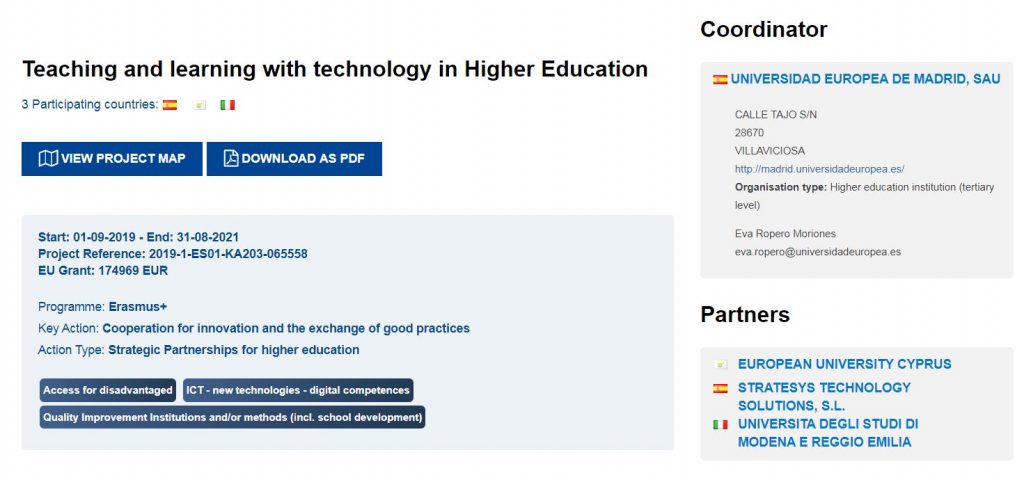
Within the strategic framework for European cooperation in education and training (“ET 2020”), the main objective of this project is to improve the quality and efficiency of learning outcomes, directly impacting the results of education and training. Specifically, it will focus on implementing new technologies that will enable greater experiential learning, improving the students’ employability, and reducing the skill gap with the labour market. Consequently, this will impact equity, social cohesion, while enhancing creativity and innovation, as the technologies implemented within this project will include among others virtual reality, augmented reality, gamification and online learning.
This project creates a specific framework in order to develop the labour market skillset through detailed methodologies. Furthermore, considering equity, social cohesion and active citizenship as one of the main EU objectives, the proposed project directly impacts it by benefiting part of the adult population that has been evidenced to partake in higher education in a lesser proportion, mainly individuals with disabilities and females with unequal access to education. Because of this, the project has the potential to promoting stronger grounds for equal access to employment opportunities as it fosters digital environment knowledge acquisition. In addition, it will contribute to higher creativity and innovation, particularly entrepreneurship, across diverse population segments and education and training levels.
The consortium is composed of four entities, all pertaining to the European Union: Universidad Europea de Madrid (Spain), who will be leading the project; Universitá degli Studi di Modena e Reggio Remilia (Italy); European University Cyprus (Cyprus); Stratesys (Spain). Each of these organizations has its own research group dedicated to innovation in education, particularly in areas related to the project. The professional trajectory of each of them supports their participation in the project, together with the parallel successful initiatives they have been carrying out, which can positively impact and create synergies with the proposed project.
The project is scheduled to deploy in a 24 month period, where the first and fifth trimester will be dedicated to plan implementation within each course, adapting the technologies as well as tools and combined methodologies to each particular case and learning outcomes. Following the planning phase, during the academic year the framework will be implemented, together with the data collection and control of the execution as well as completion of intermediate milestones through specific KPIs. These stages will require meetings between the internal coordinators of each higher education institution, whose role comprises coordinating with professors and researchers partaking in any of the project’s stages. Three of these meetings shall be in person, favouring communication and direct knowledge-sharing of the project’s advancements.
At the end of each academic year, data collected will be analysed, obtaining insights on the project’s results in terms of students’ learning outcomes and technological domain. Specifically, the project’s outcomes will be: firstly, The Experience Teacher Suite, which consists of an online ICT platform with technological tools and educational content that can be distributed and implemented by other higher education institutions; secondly, a MOOC and user guide for professors wishing to implement this framework; thirdly, open source educational tools (games, contests, assignments for developing specific skillsets, knowledge pills, among others); fourth, an experiential learning platform which through artificial intelligence algorithms (Learning Analytics) will be able to evaluate learning patterns and strengthen the implementation of the framework.
After the 12thmonth milestones, a conference will be organized, titled EDUTECH TALKS, in order to share the partial outcomes of this particular experience, incorporating feedback from professionals, while transferring knowledge on the benefits of technology-based methodologies within higher education framework and specifics on how to use the The Experience Teacher Suite. During the last trimester, publication in academic journals and participation in higher education forums will be pursued. In addition, the platform will continue to be active and therefore, individuals wishing to implement this framework will have access to content, tools or applications after the 24-month period, while being able to create new content. Lastly, the platform will include access to an online community to share best practices in educational innovation, and consult with peers. This will enable continuity of the project past the 24thmonth mark, as well as continuing the diffusion and transfer of knowledge, ensuring the sustainability of the framework beyond the project .
